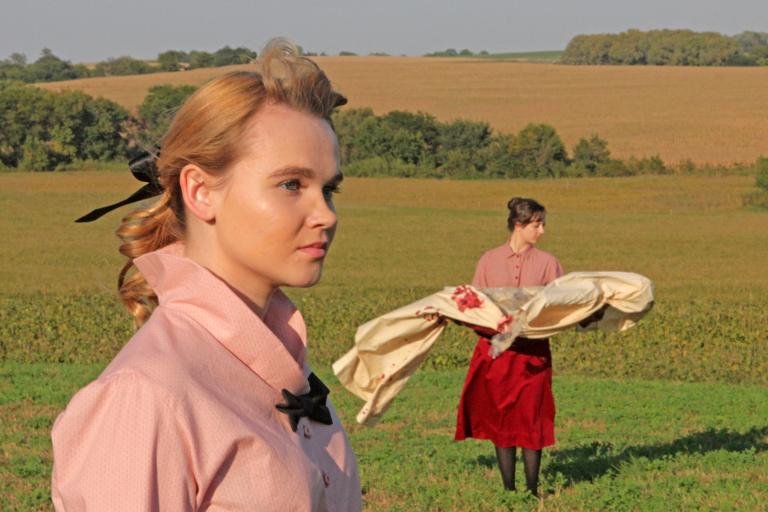
University Theatre opens season with 'Unity (1918)'
calendar icon01 Oct 2014
University Theatre opens its season Oct. 9 with Kevin Kerr’s “Unity (1918)” directed by Assistant Professor of Theatre Ian Borden.
Performances are Oct. 9-11 and 14-18 at 7:30 p.m. and Oct. 19 at 2 p.m. in the Studio Theatre, which is located on the first floor of the Temple Building at 12th and R sts.
Kerr’s Governor General’s Award-winning play, “Unity (1918)” is a warm, touching and intensely human portrait of small-town life on the prairies during the last few weeks of World War I, in a world ravaged by four years of war and suddenly hit by a mysterious and deadly plague—the “Spanish Flu.”
“This is a play about a small town in the Canadian prairie, which should feel familiar to many people in Nebraska,” Borden said. “The Spanish Flu epidemic comes to town, and they have to deal with it. These are people who are already struggling because of the war and the men not being home. The play is mostly about how the women of the town deal with it.”
Featuring a cast of nine people, the play focuses on Beatrice Wilde, who is the oldest daughter of the family and is played by Kirstie Smith.
“Their mother is dead. The father is hard at work. So she needs to take care of much of the town and kind of steps up as the hero,” Borden said.
Smith, a senior theatre performance major from Potter, Nebraska, said her character, Beatrice, has to mature very quickly.
“She tries to take care of everyone she can, including her family, and she puts the needs of others in front of her own,” Smith said. “She is shy, but an avid writer, and much of her thoughts and feelings are revealed to the audience through her journal.”
To balance her is a soldier named Hart, played by Tony Thomas, who has returned from the war.
“He is blinded by mustard gas, but wearing a Victorian Cross, which is the highest military honor in Canada,” Borden said. “They balance each other as they deal with the problems the flu brings.”
Thomas, a senior theatre performance major from Vermillion, S.D., said his character is just trying to find his place in the world.
“Hart lived his entire life in Halifax, but his mother and brother both died while he was away in the war. He goes to Unity to be with his father, who he learns has also died right before he arrived,” Thomas said. “The war took four years from him and all of his relationships. His major struggle is attempting to figure out what good he is for after spending so much time overseas and losing his sight.”
For Borden, the play is personal.
“I grew up in Canada,” he said. “I had a great uncle who was gassed in the war. My great uncle Bill volunteered when he was 15 and went through some of the nastiest fighting and survived it, so there’s a personal connection that way. But being here in Nebraska, I’ve started to recognize the way people react to things and just sort of what it is to be from this area. This play reflects a lot of those values, as well.”
Hixson-Lied Fellowship Recipient Vicki Halverson is designing the set, which plays on the fact that “Unity” is a memory play.
“What we’re doing with some of the design elements is to reflect the way an old memory gets fuzzy around the edges,” Borden said. “So some of the letters are transparent. The walls don’t have sharp edges. It’s just the way our memory tends to blur the lines.”
Smith is excited about the space the designers have created for the play.
“The audience is configured in an L-shaped thrust, something that I’ve never worked with before, so it’s been a welcomed challenge to bring the characters to life,” she said. “The set design invites the audience to explore an almost half-existence to some of the playing spaces and, as an actor, it’s been great to define and bend the rules on what the spaces within the set represent.”
Borden hopes audiences will connect with the characters and what the moment is.
“Some of it is also relevant to who we are today, as suddenly we hear about Ebola or various flu epidemics that come out,” Borden said. “The Spanish Flu had a really huge impact on Lincoln, and people have kind of forgotten this moment in time and how many people died. But the Spanish Flu in four to five months killed more people than everyone who died in World War I, and possibly as many as 50 million people worldwide.”
The play will be performed in the Studio Theatre.
“It’s very close, very personal,” Borden said. “And while there is a melancholy tone to the play, there’s also a lot of laughter. It’s a beautiful, quiet play, which means it’s very different from everything else I’ve done here so far.”
Thomas likes the simplicity of the piece.
“The thing that I love about this production is the simplicity of it all,” he said. “The play only works if each of the actors allows themselves to just be honest and truthful in every moment, which is a little intimidating, but really exciting.”
Tickets are general admission, and are available at the Lied Center Ticket Office or at carsonschool.unl.edu;. Tickets are $16, $14 faculty/staff/senior citizen, $10 students with ID. Lied Center Ticket Office hours are 11 a.m. – 5:30 p.m. Monday through Friday at 301 N. 12th or with Visa/Mastercard at (402) 472-4747 or (800) 432-3231 and one hour prior to curtain in the Temple Lobby. Seating is limited in the Studio Theatre, so reservations are recommended. There will be no late seating once the performance has started.